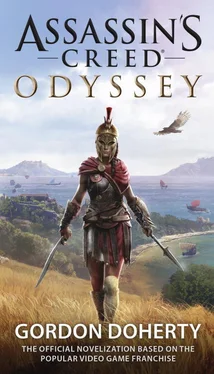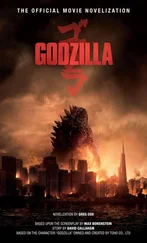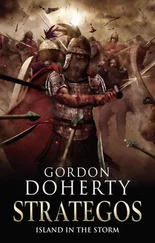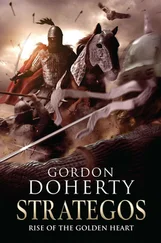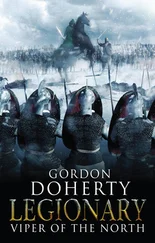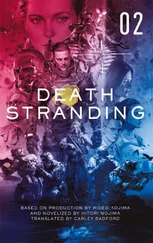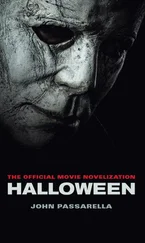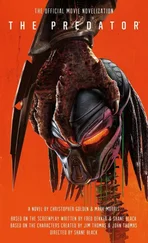Kassandra stared at him, still unconvinced.
“Very well,” Herodotos continued. “But ask yourself this: if you are running from your brother, then you must be looking for your mother?”
She nodded.
“And where will you go to find her? Hellas is vast.”
“I presume you have a suggestion,” she said tersely.
“And you know what it is,” he replied. “Athens is the hub of our world, my dear. Unlike Sparta, with its closed borders and backward-looking ways, Athens seeks traders, merchants, travelers like me. Great minds preside over affairs there. Minds in the possession of much knowledge. If there is to be a clue as to your mother’s whereabouts, it lies within the streets of…”
“Athens,” Kassandra snapped, loud enough for Barnabas to hear.
He saluted her and bawled the order to his crew. The Adrestia ’s sail groaned and the boat tacked around, altering its course to head out to sea for a long voyage around the Peloponnese, toward Attika.
Herodotos lay down to sleep. Kassandra rose and stood at the stern, watching the churn behind the trireme fizzle away in the boat’s wake. In the silvery moonlight, the rest of the sea was an unbroken sheet of gentle peaks and the sky a canopy of deep indigo, freckled with myriad stars. She stared for what felt like an eternity. When her eyes were growing tired, she blinked. One wave had seemed larger, higher, different, as if something was cutting through the water way back there. Another boat? She heard distant whalesong, drawing her gaze in a different direction. When she looked back in the Adrestia ’s wake, the phantom “boat” was nowhere to be seen. She shook her head, knowing tiredness was playing with her senses.
When she turned away from the stern, Herodotos was awake and sitting up again. He was staring at Kassandra’s bow and spear, stowed upright against the cabin.
“You eye my spear as if it is a shade.” She laughed.
He looked up at her without a trace of matching humor. “The Lance of Leonidas. As soon as I saw you with it at the temple queue, I knew you had been drawn there just as I had.”
She sat across from him with a deep sigh. “I am of Leonidas’s bloodline. Some say I shamed his bloodline.” A memory of the Cultists’ voices snaked through her mind just then. The sooner we have the bloodline, the sooner we can dispense with Deimos’s chaotic, crude ways. She held up the spear, examining it. “It speaks to me sometimes, like nothing else… until tonight.”
“That thing you described, in the Cave of Gaia. The golden artifact?” he said, his eyes looking up and around the night sky as if to check for watching wraiths.
She nodded. “It threw shackles around my mind and my heart, cast me back to times past in a way I’ve never experienced before. So sharp, visceral.” She set down the spear and shrugged. “What makes the golden pyramid and my spear so special?”
His face lengthened and paled. “The spear and the pyramid are special, Kassandra… but not as special as you.”
“I don’t understand.”
He gazed off to the prow, beckoning Barnabas over. “Soon, you will.”
• • •
Under a cloud-streaked summer sky, the Adrestia drew into an ancient, coastal pass, overlooked by towering mountains of dark rock, lined with green woods. Kassandra’s spine tingled as she looked up at the heights. Thermopylae. A place of ancient heroes.
“You’re happy with this extra stop, Misthios?” Barnabas asked.
“You trust Herodotos, thus so do I. We will continue on to Athens soon enough.” She smiled, then leapt down onto the wet sand. Herodotos climbed down with the aid of a rope ladder.
She and the historian walked up the shore, taking a winding hill track that led into the mountains. “This is the track along which Ephialtes led the Persians,” Herodotos mused, his eyes narrow, misted with moisture. He brought her out onto a small overhang that looked out onto the bay again. A little farther up the mountainside, weak trails of sulfurous steam rose from cave openings. The Gates to Hades, some said. The Hot Gates, said others. “Here, the Persians fell upon the Spartans and their allies. Here, it ended for your great ancestor.”
They came to a weathered statue of a lion, clad in cream-and-yellow lichen, the beast’s features worn smooth by buffeting coastal winds. The Spartan king’s name was still visible, carved on the stone plinth underneath. “Take out your spear, hold it, let it speak to you,” he said.
Kassandra lifted the half lance and clasped it with both hands. Nothing. “This is nonsense. It only speaks to me when it wishes to. There is no point in trying to force—”
• • •
Bang!
Arrows rained like hail, the sky dark with them. All around me, hoplites pitched over, riddled with shafts, screaming. Red-cloaked warriors fought like wolves, shouting at their allies to fight on, to stay strong. So few of them, and so many of the darker-skinned pack pressing in on them from all sides—flooding down from the hill track, spilling along the bay, a moving wall of wicker shields and sharp spears. The Spartan piper playing the call for a last stand fell, torn by a Persian lance.
“Send forth the Immortals!” a strange, jagged cry sounded from the Persian command. They came in their thousands, slashing and spearing the defenders down, breaking open that slender route south into the heart of Hellas. At the last, there were but a knot of the red-cloaked Spartans left. On they fought, lost in the dance of battle. I saw him then—older than she had imagined, his body laced with cuts and wet with blood, carrying the weight of a nation on his weary shoulders… and the unbroken spear in his hands.
“Leonidas?” I whispered.
Through the final moments of the fray, the hero-king stared through the ether and at me. Right at me. A fresh storm of arrows fell. Three struck him, yet on he fought, blocking and beating away a crowd of Immortals—his lance shattering into two halves as he did so. Another two shafts punched into his neck, pushing him onto one knee. Then a final one plunged into his breastbone. The battlefield fell silent, and King Leonidas of Sparta rolled onto his side, dead.
• • •
She blinked, the calm, deserted and rugged coastline before her free of bodies and blood, just old Herodotos smiling sadly at her.
She dropped the spear. “Why did you bring me here?”
Herodotos sighed. “Because you spoke of shame, and being unworthy of your lineage. That is not true, Kassandra. You are every bit his heir, despite what might have happened in your past.” He stooped to pick up the spear, using the leather bag again, so he would not have to touch it. He handed it back to her. “This lance and the object you saw under the Oracle’s temple… they were not crafted by our kind.”
“So they were made by Persians?”
Herodotos laughed quietly.
“Then by the Gods?” she said.
Herodotos’s laughter faded. “Not quite. They were fashioned by a people who came before. Before Hellas, before Persia, before the Trojan War, before the flood… before even time of man.”
Kassandra stared, uncomprehending.
Herodotos motioned for her to sit. He brought out a loaf of bread and broke it in two, handing her half. “I have not written of this in my histories lest men think me mad—and already some do—but I have found things, Kassandra, strange things,” he said as they ate, gazing out over the ancient pass. “One summer I came across a wandering man. A short, round little fellow by the name of Meliton, who spent his days sailing the Aegean in a tub of a boat, with no home and no destination. He told me of his adventures—some even wilder than Barnabas’s tales! I let most of the stories wash over me, but there was one that snagged my attention, for unlike all his other stories, he told this one without a glint of mischief in his eye, and with a hushed and fearful voice.”
Читать дальше
